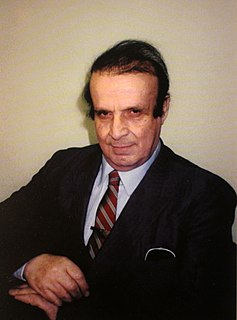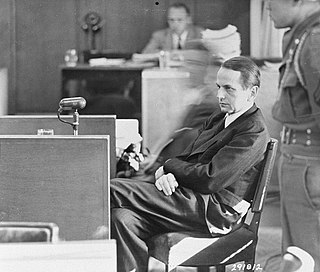Related Research Articles

Genocide is the intentional action to destroy a people—usually defined as an ethnic, national, racial, or religious group—in whole or in part. A term coined by Raphael Lemkin in his 1944 book Axis Rule in Occupied Europe, the hybrid word geno-cide is a combination of the Greek word γένος and the Latin suffix -caedo.
Historical negationism, also called denialism, is falsification or distortion of the historical record. It should not be conflated with historical revisionism, a broader term that extends to newly evidenced, fairly reasoned academic reinterpretations of history. In attempting to revise the past, illegitimate historical revisionism may use techniques inadmissible in proper historical discourse, such as presenting known forged documents as genuine, inventing ingenious but implausible reasons for distrusting genuine documents, attributing conclusions to books and sources that report the opposite, manipulating statistical series to support the given point of view, and deliberately mistranslating texts.

Holocaust denial is an antisemitic conspiracy theory that asserts that the Nazi genocide of Jews, known as "the Holocaust", is a myth or fabrication. Holocaust deniers make one or more of the following false statements:
Genocide denial is the attempt to deny or minimize the scale and severity of an incidence of genocide. Denial is an integral part of genocide and includes secret planning of genocide, propaganda while the genocide is ongoing, and destruction of evidence of mass killings. According to genocide researcher Gregory Stanton, denial "is among the surest indicators of further genocidal massacres".

This is a selected bibliography and other resources for The Holocaust, including prominent primary sources, historical studies, notable survivor accounts and autobiographies, as well as other documentation and further hypotheses.

Vahakn Norair Dadrian was an Armenian-American sociologist and historian, born in Turkey, professor of sociology, historian, and an expert on the Armenian genocide. He was one of the early scholars of the academic study of genocide and recognized as one of the key thinkers on the Holocaust and genocide. However, Dadrian's approach to history has been criticized and some of the ideas he advanced are not followed by scholars in the twenty-first century.

Guenter Lewy is a German-born American author and political scientist who is a professor emeritus of Political Science at the University of Massachusetts Amherst. His works span several topics, but he is most often associated with his 1978 book on the Vietnam War, America in Vietnam, and several controversial works that deal with the applicability of the term genocide to various historical events. Lewy rejects that the word genocide is an appropriate label for either Romani genocide or Armenian genocide.
Justin A. McCarthy is an American demographer, professor of history at the University of Louisville, in Louisville, Kentucky. He holds an honorary doctorate from Boğaziçi University, Turkey, and is a board member of the Institute of Turkish Studies and the Center for Eurasian Studies (AVIM). His area of expertise is the history of the late Ottoman Empire.

Armenian genocide denial is the claim that the Ottoman Empire and its ruling party, the Committee of Union and Progress (CUP), did not commit genocide against its Armenian citizens during World War I—a crime documented in a large body of evidence and affirmed by the vast majority of scholars. The perpetrators denied the genocide as they carried it out, claiming Armenians were resettled for military reasons, not exterminated. In the genocide's aftermath incriminating documents were systematically destroyed, and denial has been the policy of every government of the Republic of Turkey as of 2021.

The Holocaust, also known as the Shoah, was the genocide of European Jews during World War II. Between 1941 and 1945, Nazi Germany and its collaborators systematically murdered some six million Jews across German-occupied Europe, around two-thirds of Europe's Jewish population. The murders were carried out in pogroms and mass shootings; by a policy of extermination through labor in concentration camps; and in gas chambers and gas vans in German extermination camps, chiefly Auschwitz-Birkenau, Bełżec, Chełmno, Majdanek, Sobibór, and Treblinka in occupied Poland.
David Bruce MacDonald is a professor in Political Science at the University of Guelph, Ontario, Canada and is the Research Leadership Chair for the College of Social and Applied Human Sciences. From 2002 to 2008, he worked as a senior lecturer at the Political Studies Department, University of Otago, Dunedin, New Zealand. From 1999 to 2002 he was Assistant Visiting Professor in the Social Sciences at the ECSP Europe (Paris).

In 1960, the major Holocaust perpetrator Adolf Eichmann was kidnapped in Argentina and brought to Israel to stand trial. His trial, which opened on 11 April 1961, was televised and broadcast internationally, intended to educate about the crimes committed against Jews, which had been secondary to the Nuremberg trials. Prosecutor Gideon Hausner also tried to challenge the portrayal of Jewish functionaries that had emerged in the earlier trials, showing them at worst as victims forced to carry out Nazi decrees while minimizing the "gray zone" of morally questionable behavior. Hausner later wrote that available archival documents "would have sufficed to get Eichmann sentenced ten times over"; nevertheless, he summoned more than 100 witnesses, most of them who had never met the defendant, for didactic purposes. Defense attorney Robert Servatius refused the offers of twelve survivors who agreed to testify for the defense, exposing what they considered immoral behavior by other Jews. Eichmann was charged with fifteen counts of violating the law. His trial began on 11 April 1961 and was presided over by three judges: Moshe Landau, Benjamin Halevy, and Yitzhak Raveh. Convicted on all fifteen counts, Eichmann was sentenced to death. He appealed to the Supreme Court, which confirmed the convictions and the sentence. President Yitzhak Ben-Zvi rejected Eichmann's request to commute the sentence. In Israel's only judicial execution to date, Eichmann was hanged on 31 May 1962 at Ramla Prison.
Anthony Dirk Moses is an Australian historian specializing in the history of genocide, and intellectual history. He is the Frank Porter Graham Distinguished Professor of Global Human Rights History at the University of North Carolina at Chapel Hill. He is widely regarded as a leading expert on the history of genocide and ethnic cleansing, and on the history of colonialism, especially genocide in colonial contexts. He is known for coining the term racial century in reference to the period 1850–1950. He is editor-in-chief of the Journal of Genocide Research.
Genocide studies is an academic field of study that researches genocide. Genocide became a field of study in the mid-1940s, with the work of Raphael Lemkin, who coined the term genocide and is the field's founding father. The Holocaust was initially the primary subject matter of genocide studies, and the field received an extra impetus in the 1990s, when the Rwandan genocide occurred.
Kerstin von Lingen is a German military historian who specialises in the study of war crimes. She is best known for her works on Field Marshal Albert Kesselring and SS Obergruppenfuehrer Karl Wolff.

Genocide justification is the claim that a genocide is morally excusable or necessary, in contrast to genocide denial, which rejects that genocide occurred. Perpetrators often claim that the genocide victims presented a serious threat, meaning that their killing was legitimate self-defense of a nation or state. According to modern international criminal law, there can be no excuse for genocide.
Bibliography of the Armenian genocide is a list of books about the Armenian genocide:

Genocide is the deliberate and systematic destruction, in whole or in part, of an ethnic, racial, religious or national group. The term was coined in 1944 by Raphael Lemkin. It is defined in Article 2 of the Convention on the Prevention and Punishment of the Crime of Genocide (CPPCG) of 1948 as "any of the following acts committed with intent to destroy, in whole or in part, a national, ethnical, racial or religious group, as such: killing members of the group; causing serious bodily or mental harm to members of the group; deliberately inflicting on the groups conditions of life, calculated to bring about its physical destruction in whole or in part; imposing measures intended to prevent births within the group; [and] forcibly transferring children of the group to another group."
References
- ↑ "University of Edinburgh, Bloxham". Shc.ed.ac.uk. 13 October 2011. Archived from the original on 28 September 2011. Retrieved 24 August 2012.
- ↑ "The Holocaust. Critical Historical Approaches. Donald Bloxham and Tony Kushner". Us.macmillan.com. 4 December 2009. Retrieved 24 August 2012.
- ↑ European History Quarterly, Vol. 38, No. 1, 126-128 (2008), doi : 10.1177/02656914080380010408